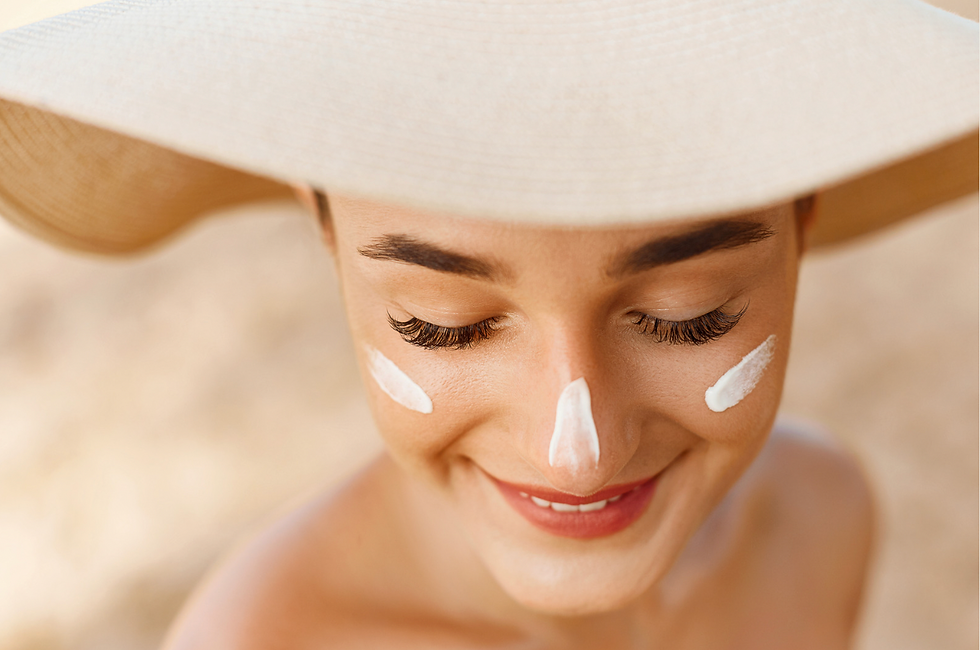How to Repair Damaged Skin: A Guide to Healing and Restoring Your Skin
- Michelle Drougas

- Dec 17, 2024
- 3 min read
Updated: Dec 20, 2024
Damaged skin can happen for many reasons—sunburn, acne scarring, overuse of harsh products, or taking certain medications. Often, your skin is a reflection of what’s happening internally. Issues like poor gut health, hormonal imbalances, or chronic inflammation can manifest as dryness, redness, breakouts, or sensitivity. The good news is that your skin has the incredible ability to repair itself with the right care and support. Here’s how you can help restore your skin to a healthier, more resilient state:
Prioritise Skin Barrier Repair
If the term "barrier repair" instantly resonated with you, there's a good chance you're dealing with transepidermal water loss (TEWL). TEWL happens when your skin's barrier is compromised, leading to moisture escaping from the skin, leaving it vulnerable and dehydrated. If your skin feels constantly dehydrated and appears red, chances are you have an impaired barrier.
The number one step for repairing your barrier is to increase your consumption of essential fatty acids. EFA's are not something that the body produces naturally but they are vital for a healthy skin barrier. See our blog, Drinking water won't hydrate your skin to learn more.
Opt for barrier-repairing ingredients like niacinamide (Vitamin B3), and panthenol (Vitamin B5). Cue Ultraceuticals B2 Range!
Avoid harsh exfoliants and irritants like alcohol or synthetic fragrances.

Keep Your Skin Hydrated
The skin needs water to function correctly, their are enzymatic processes in the skin that simply won't function if there is not enough water. Dehydration worsens skin damage by making it less elastic and more prone to irritation. Boost hydration by:
Drinking plenty of water.
Using humectant-rich products containing hyaluronic acid or glycerin.
Locking in moisture with an occlusive layer like a balm or cream.

Support Cell Regeneration
Damaged skin needs help to renew itself. Encourage cell turnover with active ingredients:
Vitamin A (retinoids): Great for regulating cell turnover, repairing damage and boosting collagen.
Enzyme therapy: Helps remove toxins, improve oxygenation, and create healthier cells.
Exfoliating acids (AHA/BHA): Use sparingly to gently remove dead skin without over-stripping.
Protect Your Skin from Further Damage
UV exposure is one of the main culprits behind skin damage. Prevent further harm by:
Wearing broad-spectrum sunscreen (SPF 30 or higher) daily.
Reapplying sunscreen every two hours when outdoors.
Covering up with hats, sunglasses and clothing when in the sun.

Use Antioxidants to Fight Free Radicals
Antioxidants protect your skin from oxidative stress, which can worsen damage and cause premature ageing. Look for:
Vitamin C: For brightening and collagen production.
Vitamin E: For soothing and healing.
Coenzyme Q10: To repair and energise skin cells.
Strengthen Your Skin from Within
A healthy diet and lifestyle can significantly impact how your skin heals. Focus on:
Eating foods rich in omega-3 fatty acids, zinc, and antioxidants.
Improving gut health with probiotic-rich foods or supplements to reduce inflammation.
Reducing stress, which can slow skin repair.
Getting enough sleep to allow your skin time to regenerate.

Seek Professional Treatments to Repair Damaged Skin
For more intensive repair, consult a skincare professional. Options include:
Be Patient and Consistent
Skin repair takes time. It's about improving skin function, and cellular regeneration. Consistency is the key and avoid the temptation to overdo treatments, as this can cause more damage.
By following these steps, you can help your skin heal, strengthen its barrier, and restore its natural glow. And remember, if you’re unsure where to start, consult with a skincare professional to create a personalised plan for your skin.
At DRML Skin Clinic, we’re here to guide you on your journey to fabulous skin. Reach out for a complimentary consultation and let us help you repair and manage your skin condition.
📞 Call us on 1300 056 657
📧 Email us at info@drmlskinclinic.com.au




Comments